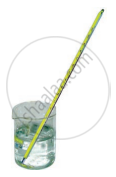Advertisements
Online Mock Tests
Chapters
2: Nutrition in Animals
3: Fibre to Fabric
▶ 4: Heat
5: Acids, Bases and Salts
6: Physical and Chemical Changes
7: Weather, Climate and Adaptation of Animals to Climate
8: Wind, Storm and Cyclone
9: Soil
10: Respiration in Organisms
11: Transportation in Animals and Plants
12: Reproduction in Plants
13: Motion and Time
14: Electric Current and Its Effects
15: Light
16: Water : A Precious Resource
17: Forests : Our Lifeline
18: Wastewater Story
![NCERT Exemplar solutions for Science [English] Class 7 chapter 4 - Heat NCERT Exemplar solutions for Science [English] Class 7 chapter 4 - Heat - Shaalaa.com](/images/science-english-class-7_6:5f2b1b2038084cf381bfa42c826a928c.jpg)
Advertisements
Solutions for Chapter 4: Heat
Below listed, you can find solutions for Chapter 4 of CBSE NCERT Exemplar for Science [English] Class 7.
NCERT Exemplar solutions for Science [English] Class 7 4 Heat MULTIPLE CHOICE QUESTIONS [Pages 21 - 23]
A marble tile would feel cold as compared to a wooden tile on a winter morning because the marble tile
is a better conductor of heat than wooden tile.
is polished while wooden tile is not polished.
reflects more heat than wooden tile.
is a poor conductor of heat than the wooden tile.
A beggar wrapped himself with a few layers of newspaper on a cold winter night. This helped him to keep himself warm because
friction between the layers of newspaper produces heat.
air trapped between the layers of newspaper is a bad conductor of heat.
newspaper is a conductor of heat.
newspaper is at a higher temperature than the temperature of the surrounding.
Paheli and Boojho measured their body temperature. Paheli found her’s to be 98.6 °F and Boojho recorded 37°C. Which of the following statement is true?
Paheli has a higher body temperature than Boojho.
Paheli has a lower body temperature than Boojho.
Both have normal body temperature.
Both are suffering from fever.
Boojho has three thermometers as shown in Figure 4.1. He wants to measure the temperature of his body and that of boiling water. Which thermometer (s) should he choose?


Thermometer (i) or (iii) for measuring body temperature and (ii) for measuring the temperature of boiling water.
Thermometer (i) for measuring the temperature of both.
Thermometer (ii) for measuring the temperature of both.
Thermometer (iii) for measuring temperature of both.
Four arrangements to measure the temperature of the ice in a beaker with a laboratory thermometer are shown in Figure 4.2 (a, b, c and d). Which one of them shows the correct arrangement for accurate measurement of temperature?
Fig 4.3 (a–d) shows a student reading a doctor’s thermometer. Which of the figure indicates the correct method of reading temperature?
Figure 4.4. (a–d) shows the readings on four different thermometers. Indicate which of the reading shows the normal human body temperature?
NCERT Exemplar solutions for Science [English] Class 7 4 Heat VERY SHORT ANSWER QUESTIONS [Pages 24 - 26]
Shopkeepers selling ice blocks usually cover them with jute sacks. Explain why.
A laboratory thermometer A is kept 7 cm away from the side of the flame while a similar thermometer B is kept 7 cm above the flame of a candle as shown in Figure 4.5.

Which of the thermometers, A or B, will show a greater rise in temperature? Give a reason for your answer.
To keep her soup warm Paheli wrapped the container in which it was kept with a woollen cloth. Can she apply the same method to keep a glass of cold drink cool? Give a reason for your answer.
In a mercury thermometer, the level of mercury rises when its bulb comes in contact with a hot object. What is the reason for this rise in the level of mercury?
A circular metal loop is heated at point O as shown in Figure 4.6.
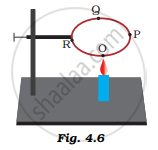
(i) In which direction would heat flow in the loop?
(ii) In which order are the pins at points P, Q and R fixed with the help of wax fall if points O, P, Q and R are equidistant from each other?
In arrangements, A and B shown in Figure 4.7, pins P and Q are fixed to a metal loop and an iron rod with the help of wax. In which case are both the pins likely to fall at different times? Explain.
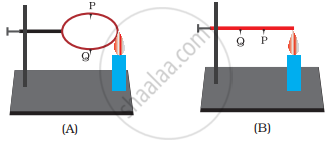
For setting curd, a small amount of curd is added to warm milk. The microbes present in the curd help in setting if the temperature of the mixture remains approximately between 35°C to 40°C. At places, where room temperature remains much below the range, the setting of curd becomes difficult. Suggest a way to set curd in such a situation.
You may have noticed that a few sharp jerks are given to a clinical thermometer before using it. Why is it done so?
Why is it advised not to hold the thermometer by its bulb while reading it?
At a campsite, there are tents of two shades – one made with black fabric and the other with white fabric. Which one will you prefer for resting on a hot summer afternoon? Give a reason for your choice. Would you like to prefer the same tent during winter?
While constructing a house in a coastal area, in which direction should the windows preferably face and why?
Observe the picture given in Figure 4.8. Water is being boiled in a pan of wide base.
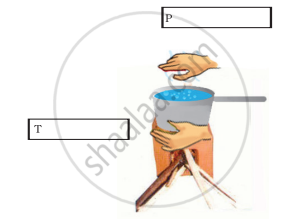
- Which position P or T will feel warmer?
- Fill up the boxes P and T to indicate the mode of flow of heat to the hand.
Look at Figure 4.9.
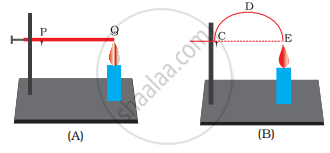
The length of wire PQ in case A is equal to the diameter of the semicircle formed by the wire CDE, in case B. One pin is attached to each wire with the help of wax as shown in Figure 4.9. Which pin will fall first? Explain.
Solutions for 4: Heat
![NCERT Exemplar solutions for Science [English] Class 7 chapter 4 - Heat NCERT Exemplar solutions for Science [English] Class 7 chapter 4 - Heat - Shaalaa.com](/images/science-english-class-7_6:5f2b1b2038084cf381bfa42c826a928c.jpg)
NCERT Exemplar solutions for Science [English] Class 7 chapter 4 - Heat
Shaalaa.com has the CBSE Mathematics Science [English] Class 7 CBSE solutions in a manner that help students grasp basic concepts better and faster. The detailed, step-by-step solutions will help you understand the concepts better and clarify any confusion. NCERT Exemplar solutions for Mathematics Science [English] Class 7 CBSE 4 (Heat) include all questions with answers and detailed explanations. This will clear students' doubts about questions and improve their application skills while preparing for board exams.
Further, we at Shaalaa.com provide such solutions so students can prepare for written exams. NCERT Exemplar textbook solutions can be a core help for self-study and provide excellent self-help guidance for students.
Concepts covered in Science [English] Class 7 chapter 4 Heat are Heat Exchange, Thermometer and Its Types, Measuring Temperature, Transfer of Heat, Kinds of Clothes Wear in Summer and Winter, Heat and Its Unit, The Temperature and a Thermometer, Conduction, Convection, Radiation.
Using NCERT Exemplar Science [English] Class 7 solutions Heat exercise by students is an easy way to prepare for the exams, as they involve solutions arranged chapter-wise and also page-wise. The questions involved in NCERT Exemplar Solutions are essential questions that can be asked in the final exam. Maximum CBSE Science [English] Class 7 students prefer NCERT Exemplar Textbook Solutions to score more in exams.
Get the free view of Chapter 4, Heat Science [English] Class 7 additional questions for Mathematics Science [English] Class 7 CBSE, and you can use Shaalaa.com to keep it handy for your exam preparation.



